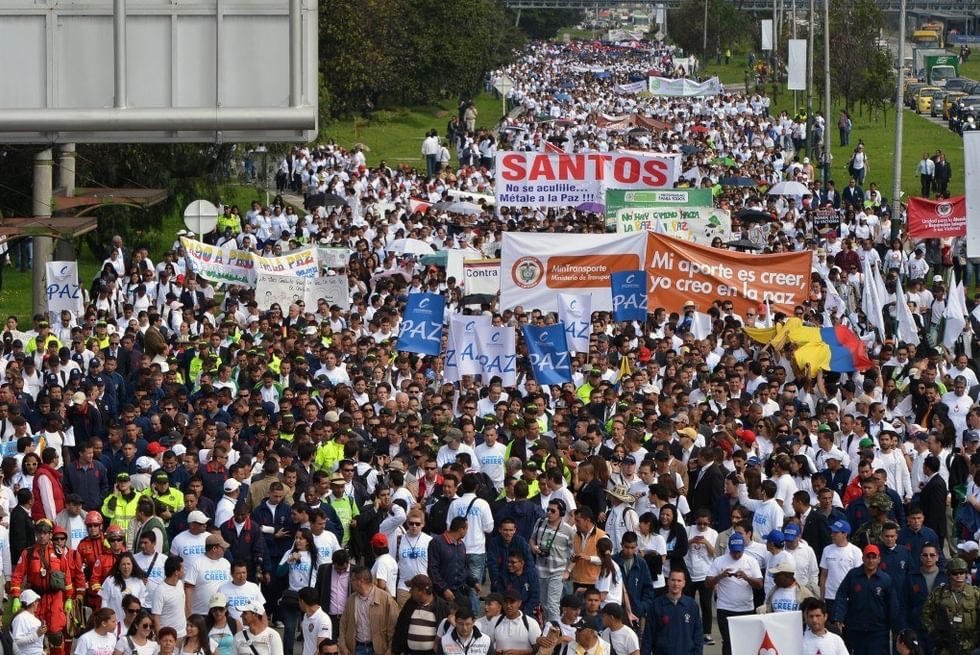Commissioning “Truth” in Transition in Florencia, Caquetá
From the Series: The Colombian Peace Process: A Possibility in Spite of Itself
From the Series: The Colombian Peace Process: A Possibility in Spite of Itself

Current debates on a possible truth commission in Colombia focus on the classification of victims, state accountability/impunity, and changing the “Colombian mentality” about the conflict (code for entrenched discourses of Colombians as inherently violent) as focal concerns for this transitional justice initiative—one of many anticipated post-conflict interventions (PECT 2014). This prognostic analysis fails to account for two deep-seated factors: secrecy and mistrust, and the remarkable heterogeneity of citizens’ experiences with the conflict. I suggest that these qualities serve as productive inroads into what truth means to a region with a long history of colonization, exploitation, and violence (Dario, González, and Wilches 2014), and in which the conflict is far from over. Caquetá and its capital city of Florencia are a critical case for understanding the possibilities and limits of a post-conflict Colombia because the region is a microcosm of many of the challenges that emerge in other areas of the country: ongoing guerrilla presence, challenges with local corruption, social and economic marginalization, drug production and consumption, conflict-related migration, and persistent instantiations of some of the conditions that contributed to the rise and persistence of the conflict (e.g., uneven land distribution, lack of security, lack of alternative economic opportunity). In the event of a peace accord, a significant amount of the demobilization and reintegration efforts will concentrate in and around this region. Colombians and post-conflict scholars would thus benefit from a nuanced understanding of how the dynamics of conflict and transition develop under these complex and interrelated conditions.
The young state of Caquetá is the long-time bastion of the Fuerzas Armadas Revolucionarias de Colombia (FARC) and sits at the trailing base of the western Andean mountain range and the beginning of the Amazon region. Despite national press and state narratives of transition out of conflict, narcotrafficking and other organized crime interests continue, and arguably have intensified amidst, a military equilibrium. As recently as mid-November 2014, the local frentes of the Southern Bloc of the FARC announced new regional leadership to replace those lost to the peace talks in Havana (El Líder 2014). In such an intensely contested terrain, how will “truth” telling exercises unfold? Any accounting will be profoundly complicated by citizens’ routinized practices of concealing conflict-related identities and by the variegated accounts of what took place over the last half century.
Especially high levels of secrecy mark interpersonal relationships in Florencia’s peri-urban communities, which receive large numbers of displaced persons and ex-combatants. Regular practices of dissimulation are the norm with regard to conflict-related identity categories on all sides. Historically, waves of unplanned migrations have contributed to and reinforced a guarded approach to identity. As was the case during the Guatemalan civil war, for example, those who continually engage in clandestine practices with regard to their identity “may begin to feel possessed by this fear that they never know whom to trust as suspicion comes to mediate every relation” (Nelson 2009, 21). An aging campesino lamented to me, for example, that “[The FARC] has made everyone enemies of each other” and, as a result, has steadily eroded societal values over his lifetime and left a citizenry gripped with fear and suspicion. The very next day this man’s neighbor sat me down and asked me if I had ever “had the privilege” of speaking to a guerrilla fighter, and went on to list the many social and economic benefits of the guerrilla presence in the region. Both of these neighbors had their own deeply contradictory and affectively laden account of what the FARC means and what it has done for (or to) Colombian society. Such heterogeneity of conflict-related accounts was the hallmark of the narratives that I collected while I was there. This dynamic milieu of variegated political subjectivities defies any potential efforts at a single account of the “truth” of it all.
I present such contextual challenges not as an argument against a truth project in Colombia, but rather as a call to recognize the climate described above as truth of its own kind, albeit a convoluted and contested one. These conditions are not merely social obstacles to be removed, but rather historically-grounded daily realities of living in a (post)conflict society under conditions of extreme precarity.

El Líder. 2014. “Los Nuevos Jefes del Bloque sur de las FARC.” November 17.
Nelson, Diane M. 2009. Reckoning: The Ends of War in Guatemala. Durham, N.C.: Duke University Press.
Programa de Estudios Críticos de las Transiciones Políticas (PECT). “Foro Central ¿Una Comisión de la Verdad en Colombia?” Paper presented at the II Encuentro Internacionl de Estudios Críticos de Transiciones Políticas, Bogotá, Colombia, October 2014.
Dario Polo Sierra, Ruben, Cristian E. Paredes González, and William Wilches Sánchez. 2014. Destino Caquetá, Naturaleza y Aventura. Florencia, Caquetá: Corporación Turística Ambiental y Cultural del Caquetá (CORTURÍSTICA).